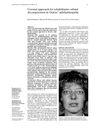 76 citations,
May 2007 in “Menopause International”
76 citations,
May 2007 in “Menopause International” After menopause, women lose a lot of skin collagen, but estrogen replacement might improve skin health.
75 citations,
March 2018 in “Molecules/Molecules online/Molecules annual” L-Cysteine may have health benefits, but its effectiveness is still debated due to limited clinical trial data.
75 citations,
September 2016 in “EMBO journal” PRC2 is essential for maintaining intestinal cell balance and aiding regeneration after damage.
 75 citations,
November 1996 in “Fertility and Sterility”
75 citations,
November 1996 in “Fertility and Sterility” Finasteride effectively reduces hair growth in women with idiopathic hirsutism, but requires careful contraception during treatment.
73 citations,
April 1999 in “Journal of steroid biochemistry and molecular biology/The Journal of steroid biochemistry and molecular biology” Vitamin D receptor is crucial for bone health and mineral metabolism.
 73 citations,
January 1997 in “British Journal of Ophthalmology”
73 citations,
January 1997 in “British Journal of Ophthalmology” The coronal approach is effective and safe for reducing eye bulging in Graves' eye disease.
71 citations,
January 2012 in “PloS one” The conclusion is that genetic differences affect how the cochlea heals after hair cell loss, which may challenge the creation of hearing loss treatments.
 69 citations,
August 2008 in “Journal of The European Academy of Dermatology and Venereology”
69 citations,
August 2008 in “Journal of The European Academy of Dermatology and Venereology” Oral dutasteride and topical pimecrolimus can safely and effectively treat Frontal Fibrosing Alopecia, leading to significant hair regrowth.
 66 citations,
June 2015 in “Aesthetic Plastic Surgery”
66 citations,
June 2015 in “Aesthetic Plastic Surgery” Platelet preparations generally show positive effects on wound healing and facial rejuvenation, but more thorough research is needed to confirm their effectiveness.
 66 citations,
December 2013 in “Nature Cell Biology”
66 citations,
December 2013 in “Nature Cell Biology” Inactive hair follicle stem cells help prevent skin cancer.
66 citations,
March 1998 in “Mayo Clinic Proceedings” Removing a testosterone-producing tumor cured a woman's sleep apnea and other symptoms.
65 citations,
December 2015 in “Experimental dermatology” Corticosteroid treatment reduces inflammation and alters hair keratins in alopecia areata.
 64 citations,
June 1992 in “International Journal of Dermatology”
64 citations,
June 1992 in “International Journal of Dermatology” Pregnancy often causes skin changes like darkening, stretch marks, and hair growth, which may improve after childbirth.
 63 citations,
September 2009 in “Regenerative Medicine”
63 citations,
September 2009 in “Regenerative Medicine” Scientists found a way to grow human hair cells in a lab that can create new hair when transplanted.
 63 citations,
August 1996 in “Forensic Science International”
63 citations,
August 1996 in “Forensic Science International” Cosmetic treatments like bleaching and perming can greatly reduce opiate levels in hair, possibly leading to false-negative drug tests.
62 citations,
October 2018 in “Journal of pathology” Keratin 17 is linked to various diseases, including cancer and skin conditions, and may be a target for diagnosis and treatment.
 62 citations,
October 2017 in “JAMA facial plastic surgery”
62 citations,
October 2017 in “JAMA facial plastic surgery” Condensed nanofat with fat grafts effectively improves atrophic facial scars.
 61 citations,
November 2020 in “Molecules”
61 citations,
November 2020 in “Molecules” Conductive hydrogels show promise for medical uses like healing wounds and tissue regeneration but need improvements in safety and stability.
 61 citations,
October 2005 in “The journal of investigative dermatology. Symposium proceedings/The Journal of investigative dermatology symposium proceedings”
61 citations,
October 2005 in “The journal of investigative dermatology. Symposium proceedings/The Journal of investigative dermatology symposium proceedings” The document concludes that accurate diagnosis is crucial for effectively treating common scalp disorders, which often have similar symptoms.
 60 citations,
December 2015 in “Clinical and experimental dermatology”
60 citations,
December 2015 in “Clinical and experimental dermatology” Laser hair removal improves quality of life but emotional benefits decrease over time, suggesting more treatments are needed for lasting effects.
 59 citations,
November 2015 in “International Journal of Cosmetic Science”
59 citations,
November 2015 in “International Journal of Cosmetic Science” Oxidative stress damages hair and contributes to aging, and managing it can help maintain hair health.
 57 citations,
March 2011 in “The American Journal of Dermatopathology”
57 citations,
March 2011 in “The American Journal of Dermatopathology” Chemotherapy can cause permanent, non-reversible hair loss similar to pattern baldness.
55 citations,
January 1988 in “Dermatology” Diphencyprone treatment for alopecia areata can cause vitiligo in some patients.
 53 citations,
May 2010 in “Dermatologic Surgery”
53 citations,
May 2010 in “Dermatologic Surgery” Hair transplantation may not work for Frontal Fibrosing Alopecia as transplanted hair was lost when the disease came back.
53 citations,
October 1998 in “The journal of investigative dermatology/Journal of investigative dermatology” Topical calcitriol-analogs can reduce hair loss caused by chemotherapy.
53 citations,
January 1985 in “Acta obstetricia et gynecologica Scandinavica” Low-dose oral contraceptives reduced hair growth and testosterone levels in women with polycystic ovary syndrome.
52 citations,
September 2021 in “Kidney International” COVID-19 vaccination may trigger lupus in some people.
 52 citations,
February 2006 in “Archives of Dermatology”
52 citations,
February 2006 in “Archives of Dermatology” Alefacept may effectively treat severe lichen planus, with patients showing significant improvement and no side effects.
52 citations,
February 2005 in “Biopolymers” Chemical hair straightening changes hair proteins and mostly fixes broken bonds.
 51 citations,
January 2012 in “Annals of dermatology/Annals of Dermatology”
51 citations,
January 2012 in “Annals of dermatology/Annals of Dermatology” A boy with alopecia regrew hair using a vitamin D cream after other treatments failed.


















